 W
WLt.-Col. David Stanley William Ogilvy, 11th and 6th Earl of Airlie was a Scottish peer.
 W
WPrince Albert Victor, Duke of Clarence and Avondale was the eldest child of the Prince and Princess of Wales and grandson of the reigning British monarch, Queen Victoria. From the time of his birth, he was second in the line of succession to the British throne, but did not become king as he died before his father and grandmother.
 W
WAnthony Ashley-Cooper, Lord Ashley TD, was a British army officer. He was the eldest son of Anthony Ashley-Cooper, 9th Earl of Shaftesbury and Lady Constance Sibell Grosvenor. His courtesy title "Lord Ashley", was used as the eldest son of the Earl of Shaftesbury.
 W
WBrigadier-General Edward William David Baird, known as Ned Baird, was a cavalry officer in the regular British Army and the reserve Territorial Force. Following service in the army, he became a successful horse trainer, winning the Grand National and the St. Leger. He was also a steward at the Jockey Club, a Deputy Lieutenant and a Justice of the Peace.
 W
WValentine Baker, was a British soldier, and a younger brother of Sir Samuel Baker.
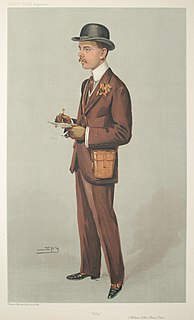 W
WSir William Arthur Hamar Bass, 2nd Baronet was a British racehorse owner and a significant contributor to the racing industry. He also provided support for the British film industry in its early days.
 W
WGeneral Henry Beauchamp Lygon, 4th Earl Beauchamp DL, styled The Honourable Henry Lygon from 1806 until 1853, was a British Army officer and politician.
 W
WMajor Henry Somerset, 7th Duke of Beaufort, KG, styled Earl of Glamorgan until 1803 and Marquess of Worcester between 1803 and 1835, was a British peer, soldier, and politician.
 W
WBasil Stanlake Brooke, 1st Viscount Brookeborough,, styled Sir Basil Brooke, 5th Baronet between 1907 and 1952, was an Ulster Unionist Party (UUP) politician who became the third Prime Minister of Northern Ireland in May 1943, holding office until March 1963.
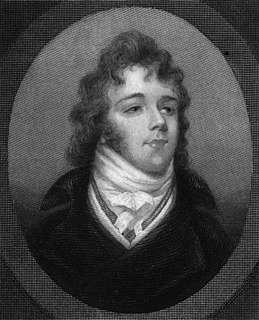 W
WGeorge Bryan "Beau" Brummell was an iconic figure in Regency England and for many years the arbiter of men's fashion. At one time he was a close friend of the Prince Regent, the future King George IV, but after the two quarrelled, and Brummell got into debt, he had to take refuge in France. Eventually he died shabby and insane in Caen.
 W
WJulian Hedworth George Byng, 1st Viscount Byng of Vimy, was a British Army officer who served as Governor General of Canada, the 12th since Canadian Confederation.
 W
WMajor The Hon. William George Sydney Cadogan MVO was a British Army officer killed in the First World War. A son of the 5th Earl Cadogan, he had previously served in the Boer War, and was equerry to the Prince of Wales from 1912 to 1914. He also played a single match of first-class cricket, for the Europeans team in the 1904 Bombay Presidency Match.
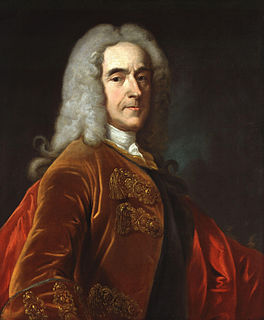 W
WField Marshal Richard Temple, 1st Viscount Cobham was a British soldier and Whig politician. After serving as a junior officer under William III during the Williamite War in Ireland and during the Nine Years' War, he fought under John Churchill, 1st Duke of Marlborough, during the War of the Spanish Succession. During the War of the Quadruple Alliance Temple led a force of 4,000 troops on a raid on the Spanish coastline which captured Vigo and occupied it for ten days before withdrawing. In Parliament he generally supported the Whigs but fell out with Sir Robert Walpole in 1733. He was known for his ownership of and modifications to the estate at Stowe and for serving as a political mentor to the young William Pitt.
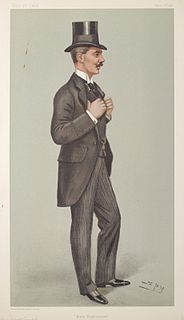 W
WLord Alwyne Frederick Compton, DSO, DL was a British Army officer who became a Liberal Unionist and then Unionist politician.
 W
WJosiah Cottin (1771–1843) was an English army officer. He is now remembered for his association with a notorious courtesan, who assumed the name Julia Johnstone.
 W
WMajor-General Hugh Richard Dawnay, 8th Viscount Downe, was a British Army general and President of the Marylebone Cricket Club.
 W
WWilliam Humble Eric Ward, 3rd Earl of Dudley, MC TD, known as Viscount Ednam until 1932, was a British Conservative Party politician.
 W
WJohn George Lambton, 1st Earl of Durham, GCB, PC, also known as "Radical Jack" and commonly referred to in Canadian history texts simply as Lord Durham, was a British Whig statesman, colonial administrator, Governor General and high commissioner of British North America. A leading reformer, Durham played a major role in the passage of the Reform Bill of 1832. He later served as ambassador to Russia. He was a founding member and chairman of the New Zealand Company that played a key role in the colonisation of New Zealand. George Woodcock says that he was, "Proud, wayward, immensely rich, with romantic good looks and an explosive temper." He was one of those "natural rebels who turn their rebellious energies to constructive purposes. Both at home and abroad he became a powerful exponent of the early nineteenth-century liberal spirit."
 W
WEdward VII was King of the United Kingdom of Great Britain and Ireland and Emperor of India from 22 January 1901 until his death in 1910.
 W
WLt. Col. Simon Edmund Vincent Paul Elwes, was a British war artist and society portrait painter whose patrons included presidents, kings, queens, statesmen, sportsmen, prominent social figures and many members of the British Royal Family. He was a favorite of Queen Elizabeth The Queen Mother.
 W
WLieutenant General Sir Charles Henry Gairdner, was a senior British Army officer who later occupied two viceregal positions in Australia. Born in Batavia in the Dutch East Indies, he was brought up in Ireland, and educated at Repton School and the Royal Military Academy, Woolwich, in England. Having served on active duty during the First World War, in which he sustained a serious wound to his right leg, Gairdner spent time at the Staff College, Camberley in the interwar period, and served as commanding officer of the 10th Royal Hussars, 6th Armoured Division and 8th Armoured Division during the Second World War. He retired from the army in 1949 and was appointed Governor of Western Australia in 1951, a position in which he served until 1963, when he assumed the role of Governor of Tasmania until 1968. Gairdner died in Nedlands, at the age of 84, and was awarded a state funeral.
 W
WGeorge IV was King of the United Kingdom of Great Britain and Ireland and King of Hanover from the death of his father, King George III, on 29 January 1820 until his own death ten years later. From 1811 until his accession, he served as regent during his father's final mental illness.
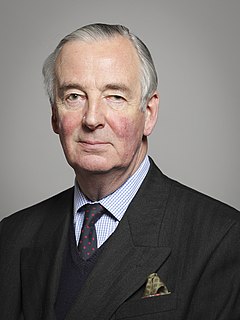 W
WSimon Mark Arthur, 4th Baron Glenarthur, DL, is a British peer, pilot and businessman. Having succeeded to his father's titles in 1976, he is one of the ninety hereditary peers elected to remain in the House of Lords after the House of Lords Act 1999, and sits as a Conservative.
 W
WPrince Henry, Duke of Gloucester, was the third son and fourth child of King George V and Queen Mary. He served as Governor-General of Australia from 1945 to 1947, the only member of the British royal family to hold the post.
 W
WLieutenant-Colonel Robert Fulke Greville FRS was a British Army officer, courtier and politician who sat in the House of Commons between 1774 and 1807.
 W
WColonel John Gurwood, British Army was a successful cavalry officer wounded at many battles on several occasions, leaving long-term emotional and physical scars. He was appointed a Companion of the Order of the Bath for his duty to the service. After Waterloo, and the re-settlement of the army on a grateful nation, Gurwood became a writer and historian. A legacy of depression and loneliness led to a tragic and untimely death.
 W
WMajor-General Charles Stanhope, 4th Earl of Harrington, styled Viscount Petersham until 1829, was an English peer and man of fashion.
 W
WLieutenant General Sir Charles Toler MacMorrough Kavanagh, was a British Army officer who commanded the Cavalry Corps at the Battle of Amiens.
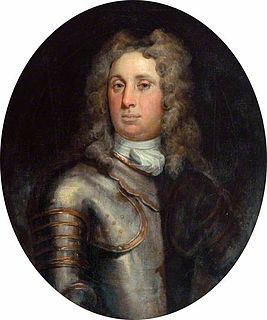 W
WLieutenant-General Peregrine Lascelles (1685–1772), also spelt Lascells, was a British military officer from Yorkshire.
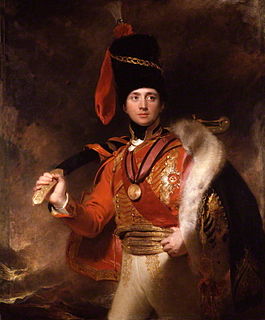 W
WCharles William Vane, 3rd Marquess of Londonderry,, was an Irish soldier in the British army, a politician, and a nobleman. As a soldier he fought in the French Revolutionary Wars, in the suppression of the Irish Rebellion of 1798, and in the Napoleonic wars. He excelled as a cavalry commander on the Iberian Peninsula under John Moore and Arthur Wellesley.
 W
WGeneral Sir William Lumley, was a British Army officer and courtier during the late eighteenth and early nineteenth centuries. The son of the Earl of Scarborough, Lumley enjoyed a rapid rise through the ranks aided by a reputation for bravery and professionalism established on campaign in Ireland, Egypt, South Africa, South America, Italy, Portugal and Spain. Following his retirement from the army due to ill health in 1811, Lumley served as Governor of Bermuda and later gained a position as a courtier to the Royal Household. Lumley is especially noted for his actions at the Battle of Antrim where he saved the lives of several magistrates and was seriously wounded fighting hand-to-hand with United Irish rebels in the Irish Rebellion of 1798.
 W
WLieutenant-Colonel Sir John Peniston Milbanke, 10th Baronet, VC was a British Army officer, and a recipient of the Victoria Cross, the highest award for gallantry in the face of the enemy that can be awarded to British and Commonwealth forces.
 W
WGeneral Sir John Mordaunt was a British soldier and Whig politician, the son of Lieutenant-General Harry Mordaunt and Margaret Spencer. He was best known for his command of the Raid on Rochefort which ended in failure and his subsequent court-martial. Cleared on a technicality, he was nonetheless barred from holding further military command.
 W
WGeneral The Honourable Sir Henry Murray was a British Army officer who fought in the Napoleonic Wars. As the younger son of an earl, he is sometimes styled "the Honourable".
 W
WLieutenant-General Charles Willoughby Moke Norrie, 1st Baron Norrie,, was a senior officer of the British Army who fought in both World Wars, following which he served terms as Governor of South Australia and the eighth Governor-General of New Zealand.
 W
WMajor Edward William Eustace "Billie" Palmes was an international Polo player.
 W
WMajor General Hon. Sir Frederick Cavendish Ponsonby was an Anglo-Irish military officer.
 W
WAnthony Ashley-Cooper, 9th Earl of Shaftesbury, was the son of the 8th Earl of Shaftesbury and Lady Harriet Augusta Anna Seymourina Chichester, the daughter of the 3rd Marquess of Donegall and Lady Harriet Anne Butler.
 W
WAnthony Ashley-Cooper, 10th Earl of Shaftesbury Bt, styled Lord Ashley between 1947 and 1961, and Earl of Shaftesbury from 1961 until his death, was a British peer from Wimborne St Giles, Dorset, England. He was the son of Major Anthony Ashley-Cooper, Lord Ashley, and Françoise Soulier.
 W
WLieutenant Thomas Algernon Smith-Dorrien-Smith JP, DL, was Lord Proprietor of the Isles of Scilly from 1872 until his death in 1918.
 W
WArthur Annesley, 11th Viscount Valentia, was a British soldier, courtier and Conservative Party politician. He notably served as Comptroller of the Household between 1898 and 1905.
 W
WSir James Webster-Wedderburn (1788–1840), often known as James Webster, was a British Army officer and dandy. He was a longtime friend of Lord Byron.
 W
WArthur Lawley, 6th Baron Wenlock, was a British colonial administrator who served variously as Administrator of Matabeleland, Governor of Western Australia, Lieutenant-Governor of the Transvaal, and Governor of Madras. The fourth and youngest son of the 2nd Baron Wenlock, he attended Eton College and Trinity College, Cambridge, before joining the military. Serving in the Mahdist War, he reached the rank of captain before resigning his commission to pursue other interests. Lawley was then private secretary to his uncle, the 1st Duke of Westminster, and subsequently to the 4th Earl Grey, who he followed to Rhodesia.
 W
WJohn Paulet, 14th Marquess of Winchester, styled Earl of Wiltshire until 1843, was a British peer and soldier.